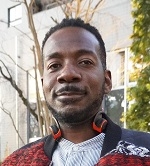Inner Diversity <1>
An Interview with Manga Artist and TV Personality Hoshino René
Everyone is a Minority in Some Way
August 12, 2022
[Special Feature 076]
For our special feature on Inner Diversity (click here for a special feature overview), we speak with Hoshino René, a man who was born in Cameroon but has lived in Japan since he was three years old. Mr. Hoshino is a manga artist who draws upon his own experiences to create humorous stories depicting the cultural differences between Africa and Japan, as well as people's preconceived ideas and misunderstandings regarding different cultures. In this interview, we discuss why Mr. Hoshino does not like to use the word "diversity" in his work, and what he believes is necessary for mutual understanding between people from differing cultural backgrounds.
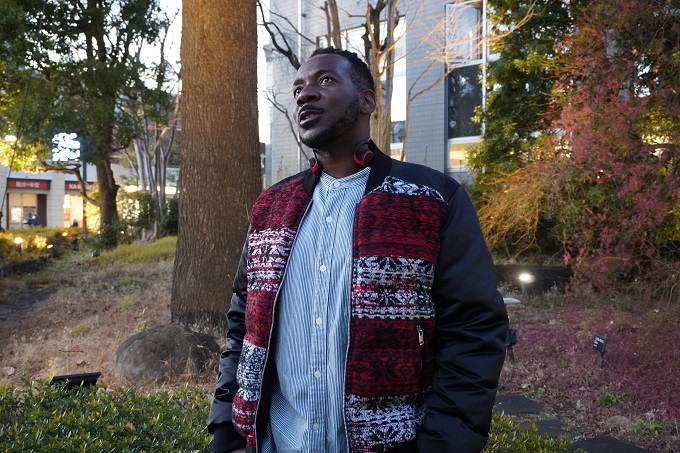
- ──I hear you were a good drawer from a very young age.
- I have a lot of siblings, and so growing up, our parents weren't able to afford as much for us as some of the other parents around us could. So, whenever I'd play games at my friend's house, I'd come home and make up my own version of those same games, or I'd play with a make-believe sword outside. I also used to draw a lot, and I've always had a strong desire to come up with my own creations.
- ──How did you get to where you are now?
- I've always been more of the quiet type. I used to be quite shy around others, almost afraid if you will. I often wondered how the people on TV were able to do what they do in front of so many people. I was able to talk to my friends, and while I enjoyed telling stories and making people laugh, I simply did not enjoy getting up in front of a large group of people.
After high school, I became friends with a guy who was around my age and who worked part-time at a clothing store. He wanted to go on a trip with his girlfriend, and he asked me if I would cover his shift for him. At first, I said, "No way! I can't talk to strangers," but he was my friend, and I wanted to help him out, so I begrudgingly took on the job, and it changed my life.
I was 19 years old, and I had never done anything in front of strangers before, but about a week into the job I was able to talk to people, albeit still with a distaste for it. I even continued sharing those shifts with my friend when he got back from his trip, and I pretty much overcame my shyness. I made friends and my personality changed. I started holding events for my friends, and I even started bartending!
My manga is actually based on the funny stories from around that time. I'd taken up work at a construction company for about two years, but once I'd learned the ropes and settled in, I thought to myself, "I want to try something different." I wanted to achieve something, and because I love manga and video games, whenever one of those characters feels lost, they go to the bar or they go to the library, and so I went to the library. The more I read, the more my interests grew. I had some savings, so I quit my job, and I read books all day long, from morning until night, every day for six months.
People seemed to really enjoy what I had to say when I started combining my personal memories and experiences with the knowledge gained from all those books at the library. They told me I should go to Tokyo and share all my amusing thoughts. I figured the best way to communicate with people would be through TV, and so I moved to Tokyo and entered the entertainment industry. However, when this career did not pan out the way I imagined it would, I remembered that I loved drawing manga, and I thought I might be able to express what I wanted to say through the medium of manga instead. This led to my book An African Boy Grew Up in Japan.
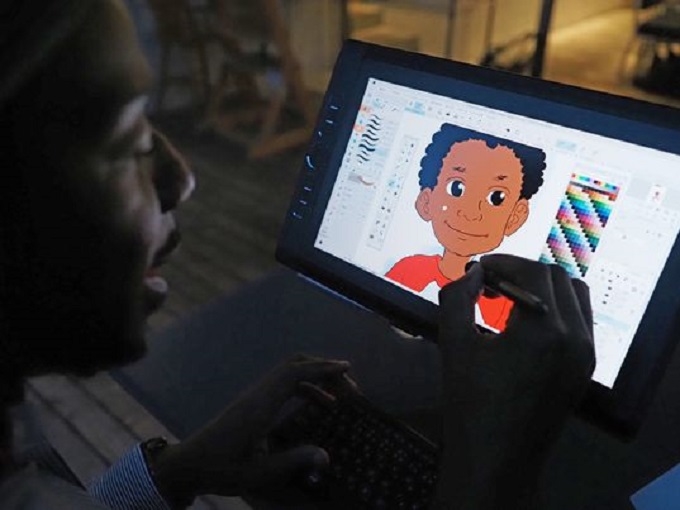 A view of the creative process of the manga An African Boy Grew Up in Japan (photo courtesy of the artist)
A view of the creative process of the manga An African Boy Grew Up in Japan (photo courtesy of the artist)- ──When was your manga first published?
- It was first published in 2018. I had started posting my drawings on Twitter (https://twitter.com/RENEhosino) and about three months later, it started trending. A publishing company noticed my manga and decided to publish it immediately.
- ──Why do you think your experiences resonate with so many people?
- The average Japanese person doesn't typically have any foreign friends or friends with a multicultural heritage, and I started drawing because I wanted to let them know that I may look African on the outside, but I'm just the same as anyone else on the inside. I wanted to let them know that there are all sorts of people out there and that some people have different lifestyles and different outlooks on life. This means people going through the same situation as me, both the foreigners themselves and the people around them, can read the manga and go, "Oh, it's the same! I get what he's going through. He's put my experience into words." I've even been told by parents of international marriages that my manga has given them the chance to understand what their children are going through.
It's not just those with international roots who also seem to feel something in common, either. Other minority groups who feel different from others, like they are outsiders, such as those in the LGBT community or those with disabilities, seem to feel solidarity with my manga as well.
Schools have recently taken on an increasing number of multicultural children, and various institutions and companies have started implementing training programs, and they have been using my manga as a reference guide. As social diversity increases in Japan, people want to have some sort of guidance that they can refer to, so I think it's a combination of a number of things.
- ──I think it's amazing how you're able to laugh off people's misconceptions based on their prejudices. Most people aren't so tolerant and tend to get upset, don't they?
- I'm sure most people do get upset. My brothers and sisters, and even the people around me all say they could never speak out the way I do. They ask me whether it's difficult or whether I feel embarrassed, but one of the reasons why I'm able to do what I do is because I am so truly blessed with the right people around me.
I wasn't bullied like crazy, but I did stand out, and I did get heckled with strange words at times. I even got into a few scuffles at times. But that was only with some people. I also had a lot of friends, and I was quite popular because of my drawings.
Another reason why I am able to do this is because I am good at making people laugh. I may be a minority on the outside, but at school, I was the majority. That's why I'm able to laugh about my hang-ups. I can brush aside my worries and my differences.
I'm also a very inquisitive person. I can understand why Japanese people would be so interested in me because I also want to learn about new things. That's why I'm not afraid to explain things about myself. I'm the kind of person who likes to observe and analyze, to investigate and to ask questions, and so I am not afraid of being seen as strange or unusual.
- ──If anything, it makes for a good story.
- I grew up in the Kansai region, and that extravagant Kansai spirit is what makes me believe that laughter is the best. I used to get teased and laughed at for being of African descent, but I would also dish it out to my friends whenever they made mistakes. Because we had this sort of give-and-take relationship growing up, it didn't really bother me so much. Still, I think it would be difficult for someone to be bullied or harassed without that element of friendship involved.
- ──It's easy to become apathetic when it comes to diversity when you think along the lines of "to each their own." But on the other hand, there are challenges in communicating with people who have no appreciation of diversity in the first place.
- You're absolutely right. You could say, "Everyone is different and that's okay," but practically speaking, there are times where that is not always applicable in the real world. For example, we all have a moral code which tells us not to steal from others and not to be mean or nasty, but what happens when someone says, "Well, I'm going to steal so it's okay for you to steal too"? There are things we need to collectively agree upon in order to live together in our society. We need to have these discussions, especially since nowadays people don't seem to have these sorts of philosophical or moral discussions.
We could talk at length about the pros and cons of freedom of choice, but when it comes to whether your hair is curly or straight, we're all different, and so we should be free to have whatever. But to say that only people with curly hair are beautiful or only people with straight hair are beautiful is taking it a step too far.
- ──What does it mean to have diversity?
- Essentially, we need to be disciplined enough to be able to properly separate our public and personal personas. Diversity means allowing people the freedom to be who they are as much as possible, but we need to keep a dialogue going. We need to discuss amongst ourselves and make a decision about certain things. We need to decide where we can all agree on a particular rule, and if we can't come to an agreement, then we need to decide how we can be accommodating to one another. Only some sort of representative can ultimately come up with the final decision. Not everyone is going to agree with this decision, and so we must be considerate towards those people as well.
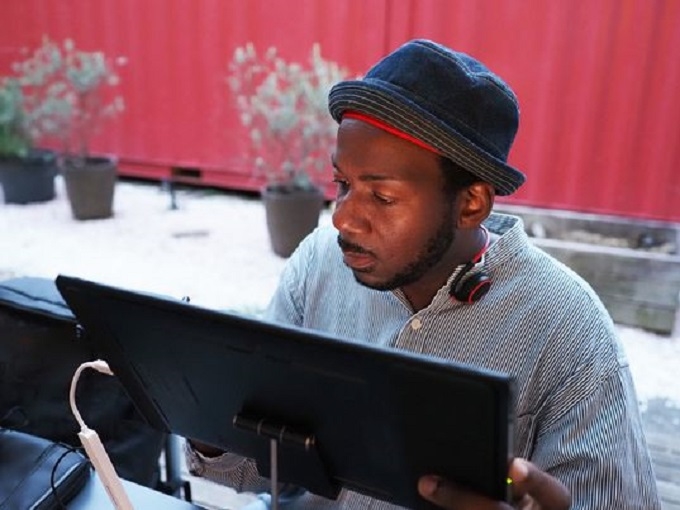 Mr. Hoshino concentrating on a drawing (photo courtesy of the artist)
Mr. Hoshino concentrating on a drawing (photo courtesy of the artist)- ──There is a scene in the manga An African Boy Grew Up in Japan where an African mother and a Japanese father get into an argument over how she throws banana peels onto the street, and he does not. They end up talking it over, and they decide to conform with the customs of the current country they are living in. I thought that was such a great educational opportunity.
- Everyone thinks the rules are crystal clear and that everybody ought to follow them, but that's not the case. It's good to have these sorts of disagreements. When I say "disagreement," I don't mean argue with each other. I mean to have constructive discussions. If we're talking about the banana peel issue, if you were to say something like "Japan has rules about these things, so you are wrong," then you shut down the entire conversation. That's not what we want. What we want is to talk it out. It doesn't really matter which side of the fence we sit on. When we have these sorts of disagreements, we will be swayed by the other person's opinion whether we like it or not. For example, the mother who thinks it's fine to throw a banana peel onto the street will probably think twice about doing so after she has debated about it because she now has it in her memory that there are people out there who don't like that sort of thing. That's why we need to talk about these things. We need to have these debates about all sorts of things. We should be bouncing opinions off of each other instead of using existing laws to determine whether something is right or wrong.
- ──This may be Japan's influence on me, but I do tend to shy away from conflict.
- That is quite a common thing to do in Japan, and it is precisely why we must make changes to our society's culture.
Japan originally had a good reason to develop its "I don't like conflict" culture. Japanese society had a ruler who had absolute power right at the top, and so there was no need for conflict. Everyone simply lived their lives never deviating from those rules that came down from the top. Even when conflict did arise, someone higher up in the chain would resolve it. But Japan does not have this sort of society anymore. Japan's social structure has changed, and that means our habits also need to change. That's why we need to be sharing our opinions with each other starting from childhood. We should be asking each other for our opinions, and we should also be offering up possible alternatives to those opinions. Adults need to set the example here for our children to be able to have these sorts of civil discussions.
- ──Growing up in a diverse environment is crucial for broadening one's mind, isn't it?
- Our environment is key. I suppose the best goal we have for eliminating bullying and discrimination within society is to reduce societal pressures and reduce our strict adherence to particular views. We need to make sure that parents can spend enough quality time with their kids, and we need to make sure that children don't feel isolated. We need to make sure we are not creating the sort of society that encourages phobias or exerts excessive pressure on people. When given the opportunity or the room to breathe, diversity is almost something that can be learned. You really just need to get that chance to learn it.
- ──There are some people who have negative views about differences or the unknown, and some people are simply not interested in diversity. Some people also question whether diversity is even something good to have in the first place.
- It's not a matter of whether diversity is good or bad. Diversity is just another fact of life.
Take a look at all the things you have inside your home. How many of those were made solely in Japan? Some of them were probably devised by someone in India, then processed by people in another country. Our society is full of things that were made by an accumulation of people from different countries. We are all coexisting with diversity right now.
Diversity makes our current way of life possible. We can travel to all sorts of places to study, and people, items, and money are constantly moving around the globe. Knowing about diversity allows you to swim and live in this sea of diversity. When you have this knowledge, you can consider where things come from, who made them, why there are so many different types of people in Japan, and what sorts of things are required in order to live alongside these people.
So many people still don't realize that diversity is an essential ingredient to society. The very society we live in is the result of all the benefits that come with diversity. Maintaining such a society requires a lot of training, knowledge, manners, and etiquette, but since there are so many people who still don't quite understand this fact, I say to myself, "Well, why don't we all learn it together?"
- ──Japan still tends to see itself as quite a homogenous society, doesn't it?
- Japanese people have this tendency to think that they are more similar to other Japanese people than to foreigners, but that is not true at all. As long as there is no language barrier, people generally have a better time talking to people who share similar tastes, like in music, manga, or anime for example. A Japanese person who likes Dragon Ball is going to have much more fun talking to a fellow African, Canadian, or Chilean who also likes Dragon Ball as opposed to a fellow Japanese person who does not like Dragon Ball. It is merely an assumption that all Japanese people are similar to one another.
It is not a case of Japanese people being the majority and foreigners being the minority. Everyone is a minority in some way. We all have a different take on love. We all have different sexual orientations. We all have different diets. We all have something inside of us that puts us in the minority.
I've been thinking lately that this is pretty much the breakthrough that I've been looking for when it comes to talking about diversification. People tend to think there are only two ways, the Japanese way and the foreign way, but that's not the case. I've recently been discussing with people whether they have parts of them that others don't seem to understand, or parts of them that would put them in the minority. I've asked them whether they've ever felt upset over not being understood. People do feel this way, and they also wish things could be different.
Diversity exists within each and every one of us. It is those pieces of ourselves that we feel we can't talk about with others, and the things that others don't understand about us. I want to let people know that it's okay to talk about these things and that we live in a society that tries to accept and understand them.
Everyone is different, after all. There are people who have managed to integrate into Japanese society after immigrating here from the United States, and there are people who have lived in Japan for their whole lives and are still unable to integrate into Japanese society. The thing is, we all have something. We all have our own issues, our own problems, and things that people don't understand.
- ──So instead of trying to connect through our similarities, we should be connecting through our differences.
- You and I can be totally different. A complete stranger could be able to empathize with someone better than their own family could. They may not even be Japanese; they could be someone from anywhere around the world.
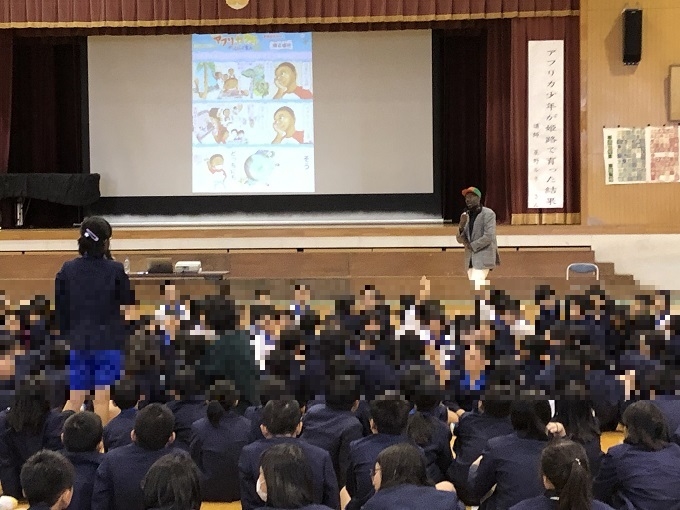 Presenting at an elementary school in his hometown of Himeji City. Discussing various topics with the children based on an episode from An African Boy Grew Up in Japan (photo courtesy of the artist)
Presenting at an elementary school in his hometown of Himeji City. Discussing various topics with the children based on an episode from An African Boy Grew Up in Japan (photo courtesy of the artist)- ──As you extend your horizons to the world, you get even more opportunities to meet with people.
- I don't actually use the terms "diversity" or "discrimination" in my work. Let's use the analogy of green peppers, which a lot of people don't like. Diversity is not about making people eat their green peppers; rather, it is about offering something tasty to people, and when they ask you "What's in this?", you can respond with "It's got green peppers in it." I'd like for my readers to finish reading my book and feel like they've got the gist of it, but when it's pointed out to them that it's a book about diversity, they realize it never even clicked in the first place.
- ──Is that because those words have strong connotations behind them?
- They do have strings attached. When you make things difficult for people, they close off all lines of communication. The good thing about creating such words is that they are good at mobilizing people, but on the flipside, they can also easily turn people away. People can become standoffish just by hearing a word that they don't like the idea of.
- ──Is kindness the key to accepting or overcoming our differences?
- I don't think it's so much kindness because kindness requires talent. I think what we need more of is experience. We need to experience people being kind to us. When people experience distress, hurt, suffering, and pain, if those experiences are not balanced out with the experience of being helped and blessed by others, then perhaps people will not be so kind in general.
If all you have are painful experiences, then society begins to look like the enemy, but then if all you ever experience is kindness, then you'll become arrogant because you won't know how to appreciate that kindness. When people struggle through pain, challenges, and a whole lot of hurt, but they also have people to watch out for them and support them, that's when they can offer the same to others when others are going through hard times. It's this sort of give and take that produces kindness.
There is talent involved, but the environment is also a huge factor. We need to let people experience failure, let them go through challenges, and give them time to process and face their struggles. That way, they can properly empathize with others, and they can meet people with warmth and kindness. We need to increase the number of people around us who are willing to extend a helping hand as a result of going through these experiences in order to increase the number of kind people in the world.
- ──We need to start by considering how we interact with those around us when we think about living in a diverse society.
- Yes, and that's why we need people to guide the way. We need role models and catchphrases to help us. I like to think that I'm doing my part as well.
It's not like I'm out here saying, "Let's all learn about diversity!" It's more about those who have the ability to do so creating a sort of curriculum and events where people who are feeling isolated or troubled feel they can take part, and it's about creating a system that when those people go home, they feel like they had a lot of fun. It really is a grassroots effort.
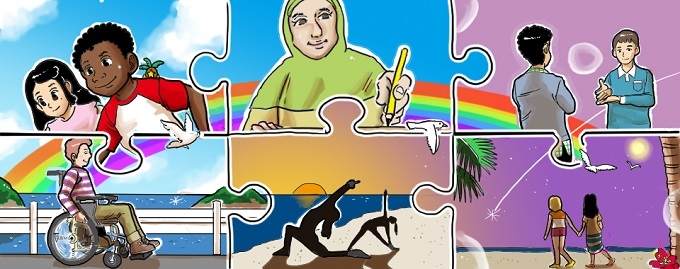 Illustrations by Mr. Hoshino specially commissioned for our special feature on Inner Diversity
Illustrations by Mr. Hoshino specially commissioned for our special feature on Inner Diversity- ──Do you feel hopeful for change on the horizon?
- I get the feeling that more and more people are starting to really question whether it's okay to be so cruel to others, whether it really is just about profit or loss, numbers, winners, and losers. More and more people are going to lose their place in the world if Japanese society is not one of compassion, kindness, and exchange with others, and I think people are starting to realize that.
I feel like the number of people who have mixed roots or international experiences has been increasing in society and in the media compared to when I first started this line of work 10 years ago. People are now coming up to me and asking, "How do you feel about this sort of expression?" which they never used to do before, so I think there is some hope there.
The current state of diversity is similar to the glass-half-full analogy. Whether you think the glass is half full or half empty, the Japan of today has progressed so much more compared to 30 or 40 years ago. We know that what we've been doing has not been entirely in vain because things are slowly but surely changing. I'd love to see a major breakthrough at some point, though.
- ──Your work has also been a great driving force.
- I would very much like to continue doing so and expressing myself in different ways. That's where my theme lies. There is still a lot of material that I can use in my manga, and there is no limit to what I can do in the future.
Interview held in Tokyo in December 2021
Interview, text, and photos: Terae Hitomi (The Japan Foundation)
* This interview was conducted while taking appropriate preventive measures against COVID-19.
Related Articles
Back Issues
- 2025.6. 9 Creating a World Tog…
- 2024.10.25 My Life in Japan, Li…
- 2024.5.24 The 50th Japan Found…
- 2024.5.24 The 50th Japan Found…
- 2024.5. 2 People-to-People Exc…
- 2024.5. 2 People-to-People Exc…
- 2023.12. 7 Movie Theaters aroun…
- 2023.6.16 The 49th Japan Found…
- 2023.4.24 The 49th Japan Found…
- 2022.12.27 Living Together with…


